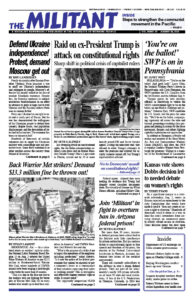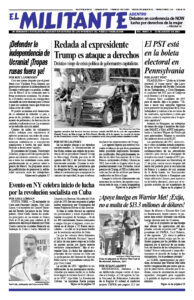FAIRFIELD, Texas — Steers crowd under trees in parched brown pasture and mileslong lines of ranchers queue at the auction house here to sell off cattle they can no longer afford to feed. Texas faces the worst drought since 2011. Multiple 100-degree days are evaporating stock tanks and drying out the grass and hay that animals feed on.
Similar conditions exist in western Oklahoma and Kansas.
“Ranchers are being forced to cull herds, including heifers and their prime stock,” rancher Nathaniel Turner told this worker-correspondent and Socialist Workers Party member Dennis Richter when we visited him at a restaurant where he also works part-time here in Freestone County July 25. Turner has a herd of 100 cattle and has to work two jobs to survive.
“Ordinarily you sell off the older cattle each year, but now a rancher may not be able to afford to feed his herd,” he said. “The price of hay has doubled. We are forced to sell cattle at sale barns where packing companies dominate and set the price. Already 14% more cows have been killed nationally” than is usual at this time of the year, he said. “The sell-off will mean fewer calves in the spring. Prices will go up.”
“The SWP presents a fighting program to offer solutions to the crisis facing workers and farmers,” Richter said. “For instance, workers need cost-of-living adjustments in every contract, so when prices rise our wages go up to match. And the party demands the government guarantee farmers and ranchers the means to cover their costs of production, including their living expenses.”
The U.S. Department of Agriculture’s Farm Service Agency has a program called Emergency Assistance for Livestock, Honeybees, and Farm-Raised Fish. It is supposed to help farmers and ranchers with some of the extraordinary costs they face, including transportation of water to livestock and expenses above normal costs of mileage for transporting feed to livestock. “All these programs would be good and are needed now,” Turner said, “but ranchers know the bureaucracy and difficulty in filing for any assistance from the USDA. In many cases the assistance comes too late.”
At the end of the visit, Turner said he looked forward to continuing the discussion. He renewed his subscription to the Militant and got two books, The Clintons’ Anti-Working-Class Record: Why Washington Fears Working People and Labor, Nature, and the Evolution of Humanity: The Long View of History.
Ranchers hit by soaring prices
Rancher Ron Hollingsworth met Alyson Kennedy, Socialist Workers Party candidate for Texas governor, at a feed store in Corsicana, Navarro County, July 30. Hollingsworth is 75 years old and owns 100 acres in nearby Barry that was bought by his family four generations ago, right after the Civil War. He leases another 600 acres.
“I have 100 head of Angus cattle,” Hollingsworth told Kennedy. “The cost of fertilizer has tripled and the ranch feed mixture I buy has gone up from $19 for two bags to $26. Due to the drought, I didn’t get a second cut of hay this year to feed the cattle.
“A year ago, diesel fuel was $2.30 a gallon, and now it’s $5.50 and up,” he said. “We haven’t had any real rain since July 2021. If it doesn’t rain until October, I will have to cull my herd.”
Hollingsworth described the disastrous effects of the rising costs of land. “When I was a kid, land in this area cost $75 an acre. Today it is $1,500 to $3,500 an acre. There are two investors who have bought up a lot of land. I despise what they have done to Navarro County. They break it up in 10- to 20-acre lots.”
“Land should not be a commodity to be bought and sold to the highest bidder,” Kennedy said. “It should be nationalized and turned over to the ranchers and farmers who use it for productive purposes.”
If land were nationalized, Hollingsworth asked, “Can I pass it down to future generations?”
“Yes, of course, as long as they keep farming,” Kennedy responded, “but land will no longer be bought and sold for profit.”
Both Hollingsworth and Turner told the SWP members about the severe drought that hit Texas between 1950 and 1957. In one decade, nearly 100,000 farms and ranches went under. The state’s rural population plummeted as people moved to the city to find jobs.
“Immediate and massive federal assistance is needed to assure that no rancher or farmer is driven from the land by a drought or by the workings of the capitalist market system,” Kennedy said.
Hollingsworth liked what he saw in the Militant and got an introductory subscription. He encouraged Kennedy to return, talk more, and visit his ranch.

